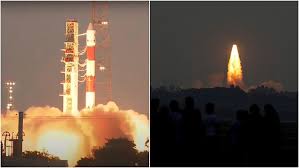Sriharikota, May 18, 2025: In a rare setback for India’s space program, the Indian Space Research Organisation (ISRO) lost its EOS-09 satellite shortly after launching the PSLV-C61 mission from the Satish Dhawan Space Centre in Sriharikota.
The launch took place at 5:59 a.m. IST, but the rocket deviated from its intended path during the third-stage propulsion phase (PS3) and failed to reach its target 524-km sun-synchronous orbit.
Mission Fails During Third-Stage Flight
Initial telemetry data suggests that the third-stage motor—which uses hydroxyl-terminated polybutadiene (HTPB) propellant—underperformed about 203 seconds into the flight. This caused the PSLV-C61 to veer off course, leading ISRO to initiate flight termination protocols, destroying the fourth stage and EOS-09 satellite to ensure debris landed safely.
About the EOS-09 Satellite
- Weight: 1,696 kg
- Purpose: All-weather Earth observation
- Technology: C-band Synthetic Aperture Radar (SAR)
- Application: Border surveillance, disaster management
The failure has temporarily delayed India’s 52-satellite SAR constellation program, which was intended to strengthen national security and disaster response.
Investigation Underway
ISRO Chairman V. Narayanan confirmed the anomaly on the agency’s official livestream. A Failure Analysis Committee has been set up to examine whether the malfunction was due to propellant flow issues, nozzle irregularities, or structural faults.
Engineers are currently reviewing manufacturing logs and test protocols related to the third-stage rocket motor.
Third Major PSLV Failure in History
This marks only the third total failure in the otherwise successful PSLV program, which has conducted 63 launches, including 58 consecutive successful missions since 2017.
What’s Next for ISRO?
Despite this setback, ISRO has four more PSLV launches scheduled for 2025. The space agency has a history of quick recoveries—past failures have seen turnaround times of less than six months.
Stay tuned for updates on the investigation and ISRO’s upcoming missions.


